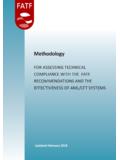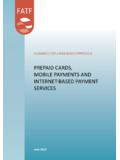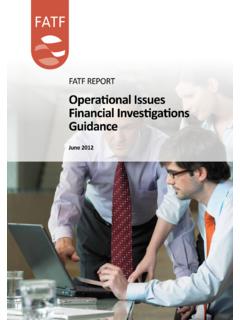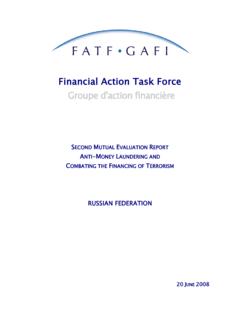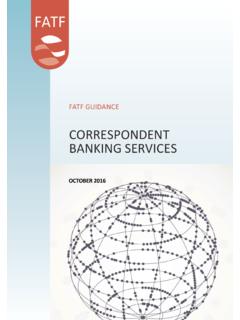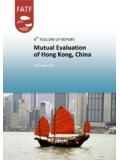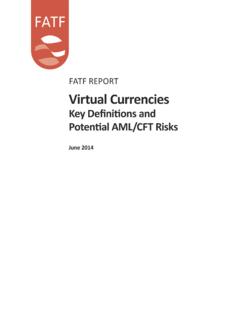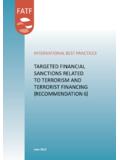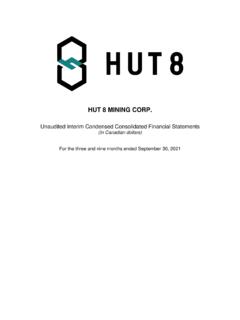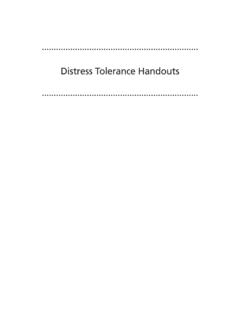Transcription of Vulnerabilities of Casinos and Gaming Sector
1 The Asia/Pacific Group on Money Laundering Financial Action Task Force Groupe d action financi re Vulnerabilities of Casinos and Gaming Sector March 2009 FATF Report 2 - 2009 FATF/OECD and APG THE FINANCIAL ACTION TASK FORCE (FATF) The Financial Action Task Force (FATF) is an independent inter-governmental body that develops and promotes policies to protect the global financial system against money laundering and terrorist financing. Recommendations issued by the FATF define criminal justice and regulatory measures that should be implemented to counter this problem. These Recommendations also include international co-operation and preventive measures to be taken by financial institutions and others such as Casinos , real estate dealers, lawyers and accountants. The FATF Recommendations are recognised as the global anti-money laundering (AML) and counter-terrorist financing (CFT) standard.
2 For more information about the FATF, please visit the website: ASIA PACIFIC GROUP ON MONEY LAUNDERING The Asia/Pacific Group on Money Laundering (APG) is an autonomous and collaborative international organisation founded in 1997 in Bangkok, Thailand consisting of 39 member jurisdictions and a number of international and regional observers. The member jurisdictions and observers of the APG are committed to the effective implementation and enforcement of internationally accepted standards against money laundering and the financing of terrorism, in particular the Forty Recommendations and Nine Special Recommendations on Terrorist Financing of the Financial Action Task Force (FATF). For more information about the APG, please visit the website: 2009 FATF/OECD and APG. All rights reserved No reproduction or translation of this publication may be made without prior written permission.
3 Applications for such permission, for all or part of this publication, should be made to the FATF Secretariat, 2 rue Andr Pascal 75775 Paris Cedex 16, France (fax +33 1 44 30 61 37 or e-mail: Vulnerabilities of Casinos and Gaming Sector March 2009 4 - 2009 FATF/OECD and APG TABLE OF CONTENTS EXECUTIVE SUMMARY .. 7 INTRODUCTION .. 9 Scope of Research .. 9 Project scope / methodology .. 11 .. CHAPTER 1: THE CASINO Sector .. 13 Introduction .. 13 Regional Overviews .. 14 21 .. CASINO Sector RISK ASSESSMENTS FOR MONEY LAUNDERING & TERRORIST FINANCING .. 22 The need for casino Sector -specific risk assessments .. 22 Guidance on Typologies Risk Assessments .. 22 Sources of information .. 23 Risks for jurisdictions without a casino Sector .. 23 Models for casino Sector risk assessments .. 23 .. CHAPTER 2: MONEY LAUNDERING METHODOLOGIES AND INDICATORS .. 25 Broad risks in Casinos .. 25 Criminal interest in Casinos players and infiltration of Casinos .)
4 26 Money laundering methods and techniques in Casinos .. 27 Casino value instruments .. 28 Indicators of ML using casino value instruments .. 31 Structuring .. 33 Refining .. 33 Indicators of ML using structuring/refining methods .. 34 Casino accounts & facilities .. 36 Indicators of ML using casino accounts: .. 38 Vulnerabilities of Casinos and Gaming Sector March 2009 2009 FATF/OECD and APG - 5 Winnings .. 39 Indicators of ML using winnings: .. 40 Currency exchange .. 41 Indicators of ML using currency exchange: .. 41 Employee complicity .. 42 Indicators of employee complicity: .. 42 Credit cards / debit cards .. 43 Indicators of ML using credit/debit cards: .. 44 False documents .. 45 Indicators of ML using false documents and counterfeit currency: .. 45 .. CHAPTER 3 Sector Vulnerabilities AND EMERGING ISSUES .. 47 Introduction .. 47 Casino-based Tourism Junkets .. 47 Vulnerabilities .. 48 Terrorist Financing .. 57.
5 CHAPTER 4 - POLICY IMPLICATIONS .. 58 Online Gaming / online Casinos .. 58 Lack of AML/CFT coverage for casino sectors .. 58 Lack of regulatory tools .. 58 Implementation of CDD measures .. 59 Application of AML/CFT controls to casino foreign branches, offices or subsidiaries .. 59 Application of AML/CFT controls to casino foreign holding accounts .. 59 Control of junket operators and their agents .. 59 Regulatory controls over VIP rooms and related facilities .. 60 Regulatory coverage of foreigners only casino models .. 60 Regulatory control over high-seas Gaming .. 60 Controls over significant contractors, systems and equipment .. 60 Lack of AML/CFT capacity / experience by casino regulators .. 60 Coordination between AML/CFT and casino- Sector supervisors .. 61 Building compliance culture in casino sectors .. 61 Law enforcement / FIU / Regulator access to information and investigation of ML/TF .. 62 International Cooperation .. 63 63 Vulnerabilities of Casinos and Gaming Sector March 2009 6 - 2009 FATF/OECD and APG BIBLIOGRAPHY.
6 65 ACRONYMS AND ABBREVIATIONS & GLOSSARY .. 67 GLOSSARY OF COMMON CASINO TERMS .. 68 APPENDIX 1. REGIONAL DATA ON CASINO 69 Vulnerabilities of Casinos and Gaming Sector March 2009 2009 FATF/OECD and APG - 7 EXECUTIVE SUMMARY The vulnerability of Casinos was recognised in the revision of the FATF 40 Recommendations, with obligations on Casinos being significantly enhanced. However, there remained a lack of recent regional or global typologies on Casinos and Gaming , which this report seeks to address. This APG/FATF report considers Casinos with a physical presence and discusses related money laundering (ML) and terrorist financing (TF) methods, Vulnerabilities , indicators to aid detection and deterrence, international information exchange. The report considers Vulnerabilities from gaps in domestic implementation of anti-money laundering / combating the financing of terrorism (AML/CFT) measures.
7 Data in the report was derived from members of the FATF, APG, other FSRBs and open sources. Online Gaming and illegal gambling are beyond the scope of this study. Overall, there is significant global casino activity that is cash intensive, competitive in its growth and vulnerable to criminal exploitation. This paper identifies significant gaps in awareness of ML typologies, gaps in regulatory and law enforcement responses, gaps in online Gaming typologies, issues with controls over junkets / VIP programs, and significant issues with controls over high seas Gaming . The report identifies significant gaps in global coverage of AML/CFT controls over the Sector , which represents a significant vulnerability. The report is a resource for policy formation. The report identifies significant ML Vulnerabilities and related case studies and typologies, but does not identify any instances of TF through the Sector .
8 Chapter 1, The Casino Sector , presents a global overview of Casinos organised by regions (some 100 countries). The overview sets out the numbers, locations and, in some cases, ownership of each Sector and coverage of AML/CFT controls. The chapter discusses some statistics and estimates of revenues (over USD70 billion globally) and profits (where known). The chapter discusses emerging casino markets, including a number of developing countries with governance and capacity challenges. Chapter 1 briefly discusses casino Sector risk assessments as a basis for allocating regulatory and law enforcement resources. The report highlights the need to identify ML risks for both those jurisdictions with or without a casino Sector . Chapter 2, Money laundering Methodologies and Indicators, considers Vulnerabilities such as casino chips, casino cheques, casino accounts and facilities, structuring through the casino, currency exchange, employee complicity, etc.
9 The paper describes typologies, case studies, and includes a summary of practical indicators for the industry, regulators and law enforcement. Casinos undertake high volume/speed financial activities that are similar to financial institutions, but in an entertainment context. Casinos are generally large cash-based businesses. Foreign exchange facilities and reduced transparency of high rollers in VIP rooms present substantial challenges. The use of foreign holding accounts where funds in one jurisdiction are available for use in a casino in another jurisdiction without the need for a cross border remittance presents further issues. Chapter 3, Sector Vulnerabilities and emerging Issues, explores a number of additional Vulnerabilities of Casinos and Gaming Sector March 2009 8 - 2009 FATF/OECD and APG Vulnerabilities and emerging issues. Casino-based tourism or junkets are identified as a vulnerability as they involve the cross border movement of people and funds and often target high net- worth / VIP clients .
10 Transparency of the movement of funds is an issue with junkets, due to gaps in controls, and weak implementation and supervision. The emerging issue of high-seas cruise ship Casinos and associated junkets is a challenge for regulators and law enforcement. The question of who has jurisdiction is prominent, including where the vessel is registered, where it operates from and where it visits. The paper notes that few jurisdictions regulate this Sector . With respect to VIP rooms and high roller customers, Vulnerabilities are noted with identifying source of funds and movement of funds. In many casino markets high-roller clients make up a large majority of casino turnover, yet only a very small percentage of casino patrons. Other Vulnerabilities discussed include corrupt or inadequately trained staff, new markets opening and terrorist financing. Chapter 4, Policy Implications, reiterates various key findings of the report and discusses a number of policy implications, including: Online Gaming requires further typologies study and sharing of cases and regulatory models is needed; A significant number of jurisdictions do not subject their casino Sector to AML/CFT controls; When Casinos are subject to AML/CFT controls, many jurisdictions lack effective implementation of preventative measures (CDD, STRs, internal controls); There is a lack of regulatory tools that carry effective, proportionate and dissuasive sanctions; AML/CFT controls over casino foreign branches, offices or subsidiaries are not well regulated and there is a need for international guidance and best practice.

